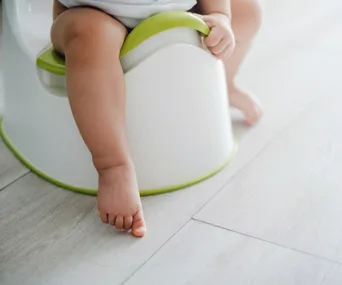In the beginning, you were responsible for every aspect of your baby’s hygiene and toileting, but now they are older what tasks can you realistically expect them to start taking care of?
Remember they’re in the ‘I can do it!’ stage, so they will hopefully be more than willing to give the following self-care skills a go.
Tooth brushing: By the age of two, they may insist on brushing their own teeth and as their motor skills improve they will do a better job. However, it’s important you do a proper clean after they’ve had a go (up until the age of seven).
Sneezes and nose wiping: Start to teach them the habit of sneezing into their elbow (as opposed to the air or their hand) to avoid spraying germs on others. By now, they’ll be wiping their own nose but still need help or reminding. Place a mirror near the tissue box so they can see what they are doing when wiping.

Toddlers are at a age where they want to start trying things for themselves. (Image: Getty)
- Dressing/undressing: It will probably take them until the age of three to efficiently dress themselves, but zippers and buttons may still be a challenge.
TIPS: Help them learn dressing through games; leave time for self-dressing; and allow choice when you can.
- Toilet training: Some kids have the physical and mental maturity to begin between 18-24 months, while others won’t show any interest until age three – particularly if their speech is a little delayed.
WATCH: Things you can’t do when you’re NOT a toddler. Continues after video …
So how and when to begin? Rule number one is to follow their lead and interest level.
Have your child sit on the potty before bath, when they are naked and in the bathroom anyway. The sound of running water sometimes makes them go! Then start trying after naptimes, when they often need to go as well.
If they are happy to sit, pop them on at regular intervals and give them something to play with or a book.
Night nappies may stay on for some time after they have the day toileting sorted.
Having your child in their own ‘big bed’ by this point will make night-time toilet training that much easier.
If it’s not working or is making everyone tense, back off and try again in a month or so.
Remember, kids can go back a step if they are sick, stressed or in times of change.

.png?resize=380%2C285)

.png?resize=380%2C285)